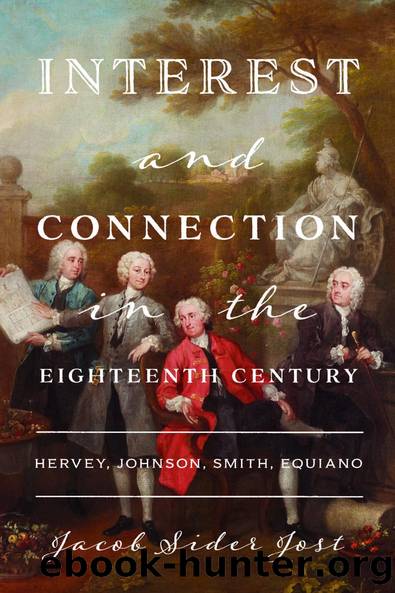Interest and Connection in the Eighteenth Century by Jacob Sider Jost

Author:Jacob Sider Jost [Jost, Jacob Sider]
Language: eng
Format: epub
ISBN: 9780813945040
Google: f55_zQEACAAJ
Publisher: University of Virginia Press
Published: 2020-01-15T00:44:57+00:00
The Limits of Interest
This attempt to imagine an alternative to modernity can be explained partly by the fact that Smith saw his eighteenth-century present as unsustainable, headed for catastrophe. Smith in the Lectures on Jurisprudence and Wealth of Nations tells again and again the story of how chieftains and lords dwindle into customers. The same historical mechanism, âLuxury, and Refinement of manners,â is responsible in the Lectures on Rhetoric and Belles Lettres for the ascendency of the âinterestingâ over the âmarvelousâ as commerce replaces barbarism in both the ancient and modern worlds: âThey who live thus in a great City where they have the free Liberty of disposing of their wealth . . . would naturally turn their attention to the motions of the human mind. . . . The French monarchy is in much the same condition as the Romans under Trajanâ (LRBL 112). Thus, eighteenth-century French novelists write like the âinterestingâ Tacitus (LRBL 111). A city filled with merchants and manufacturers will provide the monarch with âluxuriesâ and âcostly trinkets,â redirecting his feudal hospitality into consumption (WN 2:508). It will also, on Smithâs account, be naturally a city of sentimental novel readers. Finally, Smith argues in the final chapter of The Wealth of Nations, âOf Public Debts,â it will be a city of public creditors. The sovereign who spends the entire peacetime revenue on âpageantry,â âsplendid buildings,â and âother public ornamentsâ will, unlike his or her feudal ancestors, have no accumulated treasure when a war breaks out (WN 2:508). Luckily, the very merchants and manufacturers who sold their luxurious products to the sovereign will for that very reason have money to lend: âThe same commercial state of society which, by the operation of moral causes, brings government in this manner into the necessity of borrowing, produces in the subjects both an ability and an inclination to lend. If it commonly brings along with it the necessity of borrowing, it likewise brings along with it the facility of doing soâ (WN 2:509).
There is thus in Smithâs system a metonymic as well as an analogical link between interest in othersâ minds and interest on othersâ debts: both are consequences of luxury and refinement, and both belong to the commercial stage of human development. Government debt in particular, and the rentier class that it creates, are for Smith natural developments of capitalist modernity. They follow from the decline of feudalism, the rise of luxurious consumption by sovereigns, and the eagerness of merchants and manufacturers to lend their capital to finance wartime expenditure. Yet in the utopian-apocalyptic final pages of The Wealth of Nations, this debt is also an existential threat to commercial society, as Smith worries about âthe progress of the enormous debts which at present oppress, and will in the long-run probably ruin, all the great nations of Europeâ (WN 2:511).69 Smith accurately saw that the British national debt had ballooned across the wars of the long eighteenth century (including a £100 million augmentation between first publication in 1776 and
Download
This site does not store any files on its server. We only index and link to content provided by other sites. Please contact the content providers to delete copyright contents if any and email us, we'll remove relevant links or contents immediately.
Women and Jewish Marriage Negotiations in Early Modern Italy by Howard Tzvi Adelman(462)
Warrior King by Wilbur Smith(426)
The Battle of Austerlitz by 50minutes(318)
18 real-life stories of serial killers and murderers with solved and unsolved killings from the USA, UK, Europe, and beyond. by Ben Oakley(314)
Youth, Heroism and War Propaganda: Britain and the Young Maritime Hero, 1745â1820 by D. A. B. Ronald(308)
Violence and Emotions in Early Modern Europe by Susan Broomhall;Sarah Finn;(305)
Who's Who in the Zulu War, 1879: The British by Adrian Greaves Ian Knight(303)
The American Crisis by Unknown(298)
The Seeker by S. G. MacLean(253)
The Origins of French Absolutism, 1598-1661 by Alan James(247)
The Dutch East India Company and British East India Company: The History and Legacy of the Worldâs Most Famous Colonial Trade Companies by Charles River Editors(240)
The Traitor of Colditz by Robert Verkaik(237)
The Thirty Years War â Complete by Friedrich Schiller(229)
A Genius for Confusion by Richard M. Fried(226)
Fires of Faith by Catholic England under Mary Tudor(224)
Interest and Connection in the Eighteenth Century by Jacob Sider Jost(222)
Invisible Worlds by Peter Marshall(220)
The Slave Trade in Africa by Simon Webb;(220)
The Opium Wars: Exploring the Addiction of Empires from Beginning to End by Ramos Adrian & Compacted History(217)
